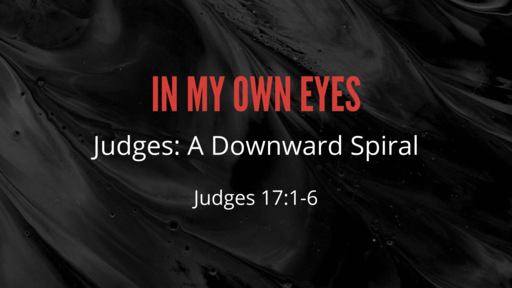In My Own Eyes

A self-centred concern for oneself, without due regard to the needs of others. Scripture treats selfishness as an aspect of sin and urges believers to care for others as well as themselves.
Introduction: In My Own Eyes
III. CLIMAX: THE DEPTHS OF THE CANAANIZATION OF ISRAEL (17:1–21:25)
1. The Religious Degeneration of Israel (17:1–18:31)
2. The Moral Degeneration of Israel (19:1–21:25)
Structurally chaps. 17–21 divide into two parts. Even though the narrator will offer the reader a window into the private lives of Israelites in each part, the first segment describes the fate of the Danites in the period of the governors (17:1–18:31); the second, the fate of the Benjamites (19:1–21:25). The plots of these two segments go their own ways, but the narratives are linked by numerous common features.
1. Both tribes, Dan and Benjam, were assigned territory in Israel’s heartland, between Judah and Ephraim, the tribes that would later lead the Southern and Northern Kingdoms respectively. By selecting episodes that concern these tribes the narrator cleverly emphasizes that the degenerating tendency in Israel was not simply a problem in the fringe territories. It had infected the very heart of the nation.
2. Both tribes found themselves in dire straights, though for different reasons. As announced in the prologue to the book (1:34–36), the tribe of Dan had been unable to occupy the territory allotted to it by Joshua and was forced to search for a homeland elsewhere. The tribe of Benjamin incurred the hostility of the rest of the nation and came frighteningly close to disappearing as a victim of Israel’s “holy war.”
3. In both accounts the crisis was precipitated by the actions of a nameless Levite.
4. In both accounts the Levite had a Bethlehem-Judah connection. The first Levite came from Bethlehem-Judah (17:7–8); the second traveled to Bethlehem-Judah (19:1–2).
5. Both Levites had connections with Mount Ephraim. The first Levite ended up in the household of Micah, who lived on Mount Ephraim (17:1); the second actually lived in this region (19:1).
6. Both accounts involved priestly characters inquiring of God concerning the outcome of a proposed plan of action (18:5–6; 20:27–28).
7. Both accounts conclude with a reference to Shiloh. Judges 18:31 notes that the Danites continued to use Micah’s idols as long as the tabernacle was at Shiloh; in 21:19–24 the narrator describes an event that took place at Shiloh.
8. In both accounts military contingents consisting of six hundred men played a critical role (18:11, 16–25, 25; 20:47; 21:7, 12, 14, 16–17, 23).
9. Both accounts are punctuated by variations of the refrain “In those days Israel had no king” (17:6; 18:1; 19:1; 21:25). In the first the formula is inserted at critical junctures in the narrative and functions as an episode marker; in the second the formula frames the entire narrative, appearing at the beginning and the end. Twice, once in each section, the formula is augmented with, “Everyone did as he saw fit” (17:6; 21:25).
